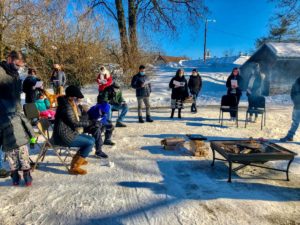News
8/8/21: Clergy Message from Rev. Dan Kline
This past Sunday I preached on the intersection of ecology, First Nations, and the Christian story. St. Paul’s has a long history of engaging with those powerful topics. The Right Rev. William Hobart Hare, whose image can be seen in fresh relief on the right side of our newly restored reredos, was an early rector of our parish. He later became the bishop of the Diocese of Niobrara in the Dakotas. Our last rector, the Rev. Cliff Cutler, protested against the Dakota Access Pipeline at the call of the Rev. John Floberg, Canon Missioner for The Episcopal Church on the Standing Rock Reservation.
When I was looking at the Rev. Eric Hungerford’s Facebook announcement of his call to St. Paul’s, I noticed that Rev. Floberg (who also happens to be our contact for the Standing Rock Reservation Language Project we raised money for through the Mother’s Day Youth Car Wash) was a friend of Fr. Eric’s. He commented on the history between St. Paul’s and the people of the Dakotas. Fr. Eric replied: “One of the signs for me that the Holy Spirit was leading me there was that when my wife Shyla and I were touring the building, she pointed out a beautiful Star Quilt on the wall. When I walked over to see the quilt, I was bowled over to see a photo of Terry Star presenting it to the congregation. I felt that Terry’s blessing was on that place. It was a gift and a sign for me.” As we get ready for our new rector’s first Sunday on August 15th, we can rest assured that this long tradition of partnership will remain intact.
 At the same time, Fr. Eric’s coming presents new ways of thinking about how we will relate to indigenous peoples in our life together. After church, I was talking with a few parishioners and we said to one another, “Well there’s not much we can do about the people who formerly lived in Chestnut Hill. Genocide seems to have not left many people for whom we can right any wrongs.” We had done a land acknowledgment in the snow this past winter during our Lenten Campfire Liturgy as a way to begin thinking about how we might relate to the people who once lived on our campus. At that time and after this week’s sermon, it still wasn’t clear what the next tangible step was for relating to the Lenape. I walked away thinking, “Was there more we could do with regards to the people who used to live on the Hill?”
At the same time, Fr. Eric’s coming presents new ways of thinking about how we will relate to indigenous peoples in our life together. After church, I was talking with a few parishioners and we said to one another, “Well there’s not much we can do about the people who formerly lived in Chestnut Hill. Genocide seems to have not left many people for whom we can right any wrongs.” We had done a land acknowledgment in the snow this past winter during our Lenten Campfire Liturgy as a way to begin thinking about how we might relate to the people who once lived on our campus. At that time and after this week’s sermon, it still wasn’t clear what the next tangible step was for relating to the Lenape. I walked away thinking, “Was there more we could do with regards to the people who used to live on the Hill?”
King David, whose stories we’ve been encountering on Sundays this summer, faced a similar situation. None of the descendants of Jonathan, best friend and possibly lover of David, were thought to be left alive. Jonathan was the son of King Saul, who hated David as a threat to his dynasty. Not many descendants had survived in the civil wars following Saul’s death. In 2 Samuel 9, David asks, “Is there still anyone left of the house of Saul to whom I may show kindness for Jonathan’s sake?” After an extensive search, they find one son of Jonathan: Mephibosheth. Mephibosheth is disabled – he cannot walk. This is probably why he escaped detection – he’s been living as a beggar. Mephibosheth is afraid that King David will discover his identity and kill him. What does David say when he meets Jonathan’s son for the first time? “Do not be afraid, for I will show you kindness for the sake of your father Jonathan; I will restore to you all the land of your grandfather Saul, and you yourself shall eat at my table always.”
As I was scrolling through the news this week, I came across an article entitled, “‘We just want to be welcomed back’: The Lenape seek a return home.” In this piece, the history of the Lenape is detailed, along with their current struggle. Adam Waterbear DePaul is one of the leaders of the Lenape Nation of Pennsylvania and says, “Lenape history in this area has been incredibly erased, even more so than many other Native American tribes, with us being one of the first-contact nations out here on the East Coast…Pennsylvania is the only state in our Indigenous homeland and one of the…minority of states in the country now that has never acknowledged the Native American people. We are trying to change that. We currently have a state recognition committee. I’m actually on the committee, and we are approaching the state right now and hoping that they will agree to acknowledge us.” As we welcome the Hungerfords to their new home this week, how might we consider what it would mean to welcome the Lenape home too? What might the Spirit be calling us toward as we start this new chapter? How might we continue to widen our Table and welcome our long lost family home?
